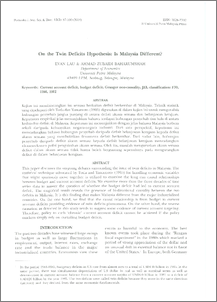Citation
Lau, Evan and Baharumshah, Ahmad Zubaidi
(2004)
On the twin deficits hypothesis: is Malaysia different?
Pertanika Journal of Social Sciences & Humanities, 12 (2).
pp. 87-100.
ISSN 0128-7702; ESSN: 2231-8534
Abstract
This paper discusses the on-going debates surrounding the issue of twin deficits in Malaysia. The statistical technique advocated by Toda and Yamamoto (1995) for handling economic variables that might spuriously move together is utilized to examine the long run causal relationships between budget and current account deficits. We examine more than the three decades of time series data to answer the question of whether the budget deficit had led to current account deficit. The empirical result reveals the presence of bi-directional causality between the two deficits in Malaysia. It is this finding that makes Malaysia different from the major industrialized countries. On the one hand, we find that the causal relationship is from budget to current account deficits providing evidence of twin deficits phenomena. On the other hand, the reverse
causation as detected in this study tends to suggest some evidence of current account targeting. Therefore, policy to curb 'chronic' current account deficit cannot be achieved if the policy markers simply rely on curtailing budget deficit.
Download File
![[img]](http://psasir.upm.edu.my/style/images/fileicons/application_pdf.png)  Preview |
|
PDF
On_the_Twin_Deficits_Hypothesis_Is_Malaysia_Different.pdf
Download (5MB)
|
|
Additional Metadata
Actions (login required)
 |
View Item |

